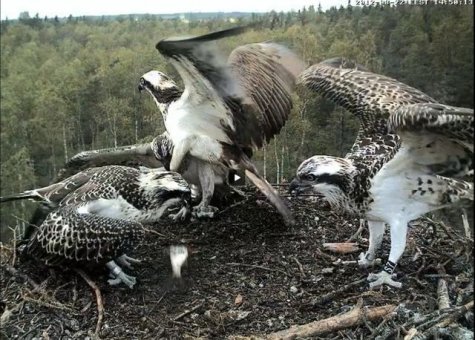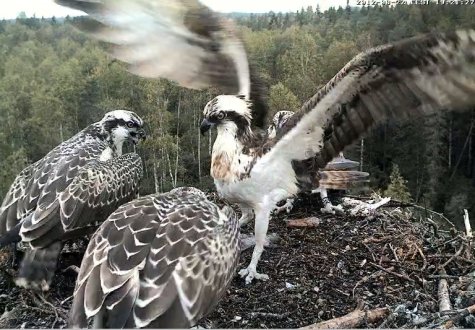Ospreys looking southwards
Text: Urmas Sellis (ESTLAT coordinaator)
Translation: Liis
Over a month ago we wrote that the Estonian osprey chicks were quiet at feeding as good table manners require but the "Latvians“ made a racket. Today all has changed – at the Latvian nest all has gone silent; the juveniles have evidently started their migration. By contrast, in the Estonian osprey nest we can see and hear plenty of commotion, fighting and struggles particularly when male bird Madis brings a fish...
But so young ospreys have started their lives for millions of years already and so it goes on in thousands of osprey nests all over the world. In nature nothing is in vain. To stand up for oneself has to begin already as a chick in the nest, to be the one to stay alive in the natural selection process.

Even the male parent can get hurt when three chicks fight for the fish Photo: meriyll (from LK forum)
On August 4th we tried to catch male parent Madis, to put a transmitter on him but instead Piret got caught in the net. So she got the Polish-produced backpack instead. The capture was undertaken in a period of as low risk as possible, that is, in case something untoward were to have happened the juveniles would not have been affected. But all worked and no problems were encountered. Piret had already started to keep away from the nest and soon went some twenty kilometres away to get herself into a good nutrition state for the migration. She rarely visited the nest during the period until she started her migration on August 17th. In three days Piret flew to the Black Sea shore and now stays in the Dnepr river estuary, probably preparing for the second migration stage.
In Estonia we provided another osprey with a transmitter too, a male bird in Tartumaa. He is still at the nest location.
In Latvia both birds in one osprey pair got transmitters; of them the female started her migration on August 20th, and the male is still at the nest.
At present we are busy in the ESTLAT project with augmenting the bird migration map programme, in order to be able to add the data from the new transmitters there. We will let you know when the ESTLAT birds can be seen on the migration map.
All that happened in the nest of Piret and Madis can be followed pretty much in detail in the Looduskalender forum. The forum members have made a great number of video clips too; one of them can be watched here.









